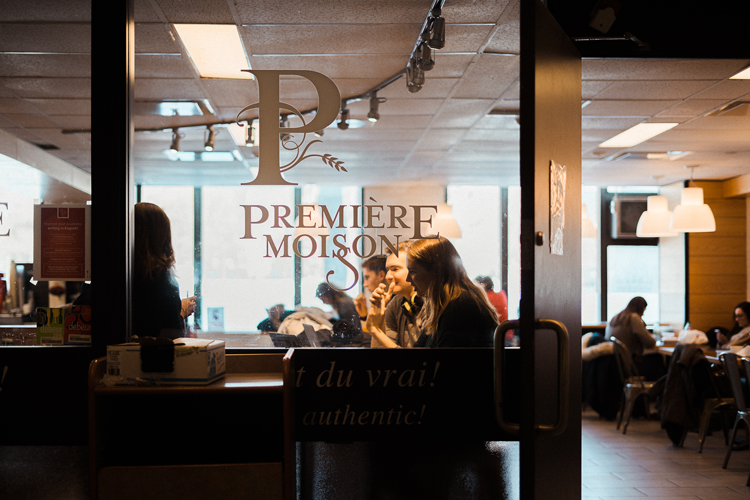In 2014, McGill decided to replace the Tim Hortons in the Redpath-McLennan library with Première Moisson, a Quebec–based café chain. Student Housing and Hospitality Services (SHHS) made this decision without consulting the Students’ Society of McGill University (SSMU). In a Sept. 25 address the same year, Vice-President University Affairs Joey Shea discussed meeting with the director of SHHS about students’ concerns with Première Moisson. Shea stressed students’ worries about Première Moisson’s high prices and lack of communication from the school. McGill now faces a similar situation once again.
At the end of the 2018-19 school year, Première Moisson’s lease in the Redpath library will be up for renewal. Première Moisson was asked for a statement but declined, saying that they had no information to report.
While the decision is made solely by SHHS and other administrators, students can still make their voices heard. According to Marketing and Nutrition Advisor Monique Lauzon, 74 per cent of students liked Première Moisson and gave it a ‘good’ rating.
“[SHHS] conducts a campus-wide Food and Dining Survey every two years,” Lauzon said. “Our most recent survey dates back to February 2018. In that survey, Première Moisson received an overall positive rating of 74 per cent [285 students responded that they visit Première Moisson.]”
In a survey* conducted by The McGill Tribune, only 29 of 314 respondents said they wanted Première Moisson’s lease to be renewed. Most respondents were not regular customers, visiting zero to two times per week. Despite SHHS’s positive survey, a large majority of respondents to the Tribune’s survey indicated that they were very disappointed with Première Moisson’s food and beverages. Of the 282 students that made further comments about Première Moisson, over 80 of them mentioned affordability as a major concern.

(Arshaaq Jiffry / The McGill Tribune)
“Première Moisson is inexplicably overpriced and relies on academically-stressed students needing nourishment at convenience,” one respondent said, who goes to Première Moisson over six times per week. “A decently-priced café would be so much better and would alleviate already high stress levels from the library.”
In over 140 replies, students mentioned that they would like to see Tim Hortons replace Première Moisson after their lease is over. However, future construction projects complicate negotiations for the space.
According to SSMU President Tre Mansdoerfer, the upcoming Fiat Lux project—a massive renovation of McGill’s libraries—means that the Redpath location could be closed for some time.
“No major company will enter that building knowing that they won’t be able to have business for three or four years,” Mansdoerfer said.
Mansdoerfer mentioned another alternative that may satisfy students’ strong desire for an on-campus Tim Hortons.
“I am trying to see if we could get [Tim Hortons] in the SSMU building itself,” Mansdoerfer said. “McGill may not be able to commit to it, but maybe we could. I can’t make any promises, but there is an effort to see that explored.”
Mansdoerfer was not the only one to mention the Fiat Lux project as a potential problem in negotiations over what will stand in Première Moisson’s place.
“[SHHS] is very conscious of the upcoming library renovation project, which is slated to begin in early 2022,” Lauzon said. “Given this, we will need to evaluate the practicality of investing in changing out [or] renovating Première Moisson at this particular time.”
Nonetheless, administrators are aware of students’ discontent with Première Moisson and concerns about its pricing.
“I’m pretty confident that [Première Moisson] won’t be there next semester,” Mansdoerfer said. “I’m not on the committee for [deciding the Redpath’s outcome], but I’ve had multiple conversations with Marisa Albanese [senior director of SHHS] and the Executive Chef of Dining Services Oliver De Volpi. They are fully aware that Première Moisson is not liked. It’s pricey and not what students want.”
*The survey referenced in this article does not meet scientific standards. It was conducted through Google Forms and distributed to various online McGill community groups, receiving 314 responses. It included multiple choice and open-ended questions.







